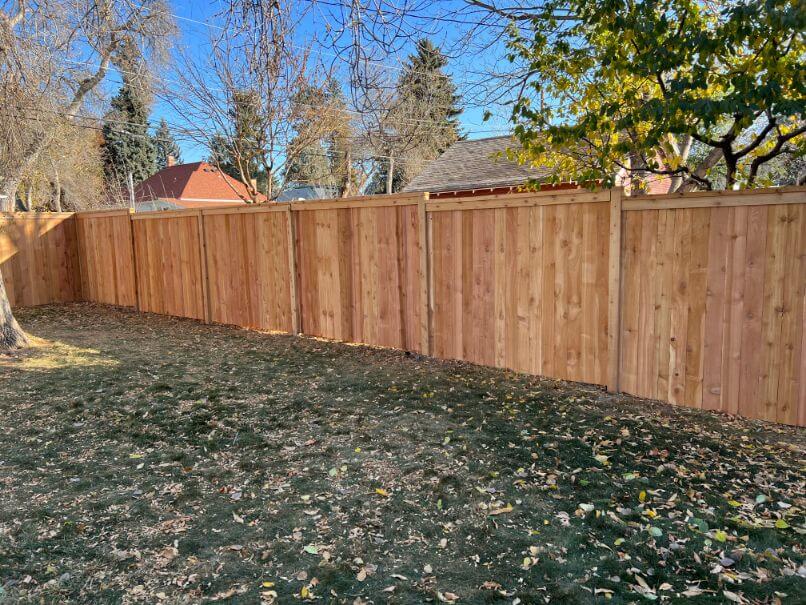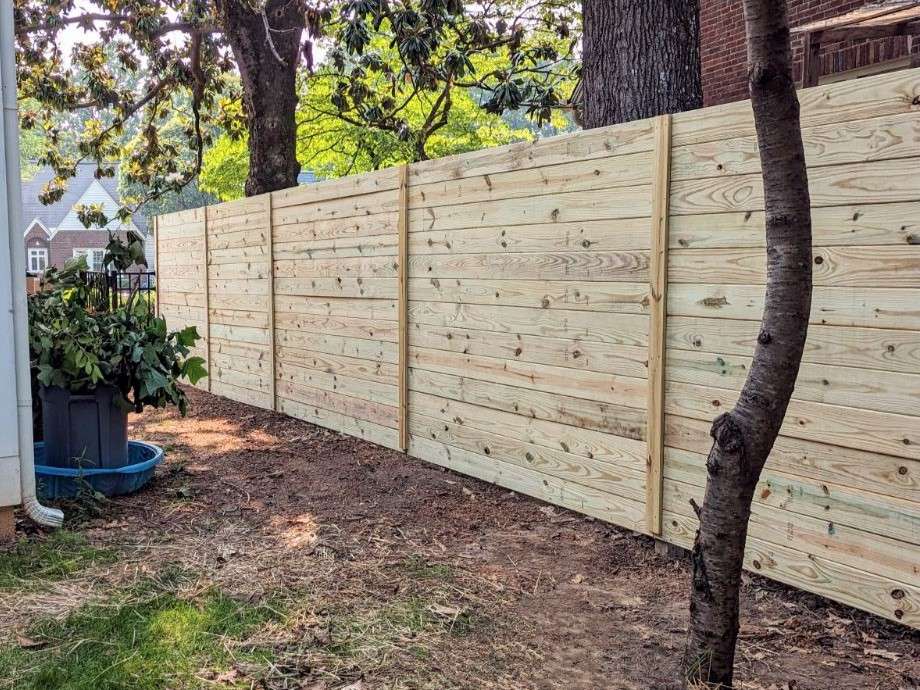All Categories
Featured
Picking the right fence product for your property is a considerable decision, and each choice comes with its own collection of benefits and challenges. Wood, plastic, and light weight aluminum are amongst the most preferred materials for both property and industrial fence. Below's a break down of the pros and cons of each to help you determine which is finest for your demands.
Timber Secure Fencing. Pros:
Visual Charm: Timber offers a classic, natural look that complements almost any type of style of home. It can be repainted or discolored in a wide variety of shades, enabling complete modification. Whether you're intending for a rustic, country-style appearance or a more refined and refined look, timber is flexible.
Cost-Effective: Generally, timber fencings are one of the most affordable choices when it comes to upfront costs. It's a great alternative for those on a budget plan that want a top quality fence without a high rate tag.
![]()
Modification: Wood can be easily adjusted to fit any kind of shape or size. You can select from different styles such as personal privacy, picket, or ranch-style fencings. It's also simple to customize, repair, or replace components if required.
Cons:
Upkeep: Timber fences call for routine upkeep. They need to be tarnished or repainted occasionally to stop rot, bending, or insect infestation. Without upkeep, timber can wear away quicker, specifically in damp or damp environments.
Vulnerability to Damages: Wood is vulnerable to harm from insects, such as termites, and climate condition, like high winds, rain, or snow. Over time, exposure to these elements can cause the wood to split, splinter, or warp.
Much Shorter Lifespan: While wood fences can last for numerous years, they normally have a shorter lifespan compared to vinyl or aluminum, especially otherwise maintained regularly.
Vinyl Fencing. Pros:
Low Upkeep: Among the most appealing features of plastic fences is that they need little to no upkeep. Unlike wood, vinyl doesn't need to be repainted or discolored. It's resistant to fading, cracking, and bending, making it ideal for those who want a problem-free fence.
Toughness: Vinyl fencings are incredibly sturdy and can hold up against rough weather conditions, including severe warmth, heavy rainfall, or snow. They're likewise immune to bugs like termites, which can destroy wood fences.
Long Lifespan: Plastic fences can last for 20-30 years or even more with marginal upkeep. Numerous suppliers provide guarantees, supplying satisfaction and further improving the value of your investment.
![]()
Selection of Styles: Readily available in a series of shades, textures, and layouts, plastic fences can resemble the appearance of wood yet without the maintenance. They are offered in vogue like privacy, picket, and ornamental, making them highly personalized.
Cons:
Higher First Cost: The upfront price of vinyl fence is usually greater than wood, making it less economical for some. Nonetheless, its long life and low upkeep make it a beneficial financial investment in the future.
Breakable in Winter: In colder climates, vinyl can end up being breakable gradually, which makes it much more susceptible to splitting if based on influence. This might be an issue in locations with harsh winters months.
Limited Modification: While plastic can be found in a selection of designs and shades, it's not as customizable as wood. If you have an extremely certain vision in mind, plastic might not be the ideal selection.
Aluminum Secure Fencing. Pros:
Reduced Maintenance: Aluminum is another product that needs really little upkeep. Unlike wood, it does not corrosion, corrode, or fade. This makes it suitable for settings with severe weather condition or coastal areas where deep sea can create rust.
Resilience: Aluminum fencings are known for their stamina and long life-span. They can endure severe weather condition, and unlike wood or plastic, they are immune to bugs and won't degrade in time.
![]()
Aesthetic Allure: Aluminum fences give a sleek, elegant appearance and are often made use of for decorative functions. They are available in different styles and coatings and can enhance the total curb appeal of your property.
Protection: Light weight aluminum is a tough product, making it a superb choice for supplying safety and security around your building. It's frequently utilized for residential safety and security fencing in addition to for swimming pool units.
Cons:
Price: Aluminum fencings are typically more pricey than timber and occasionally also plastic, particularly when deciding for attractive or custom-made styles. The initial expense may be a deterrent for some building proprietors.
Less Personal Privacy: One of the downsides of light weight aluminum is that it usually supplies much less privacy contrasted to wood or vinyl. The spaces between the slats or bars can be wide, which enables people to translucent the fence. This may not be the ideal alternative. if personal privacy is crucial to you.
Denting: While aluminum is sturdy, it is at risk to denting from heavy effects, such as automobile mishaps or vandalism. While it won't corrosion, a dent can jeopardize its look and integrity.
Which Material Should You Choose? The choice in between timber, aluminum, and vinyl secure fencing comes down to your spending plan, the quantity of upkeep you're eager to deal with, and the certain needs of your home. If you prefer an all-natural, customizable look and are eager to keep it, wood might be the means to go.
Consider your residential property's environment, the degree of personal privacy or protection you call for, and the long-lasting financial investment you agree to make. Whichever product you pick, each offers unique benefits that can boost your home or company while offering performance and design.
Timber Secure Fencing. Pros:
Visual Charm: Timber offers a classic, natural look that complements almost any type of style of home. It can be repainted or discolored in a wide variety of shades, enabling complete modification. Whether you're intending for a rustic, country-style appearance or a more refined and refined look, timber is flexible.
Cost-Effective: Generally, timber fencings are one of the most affordable choices when it comes to upfront costs. It's a great alternative for those on a budget plan that want a top quality fence without a high rate tag.

Modification: Wood can be easily adjusted to fit any kind of shape or size. You can select from different styles such as personal privacy, picket, or ranch-style fencings. It's also simple to customize, repair, or replace components if required.
Cons:
Upkeep: Timber fences call for routine upkeep. They need to be tarnished or repainted occasionally to stop rot, bending, or insect infestation. Without upkeep, timber can wear away quicker, specifically in damp or damp environments.
Vulnerability to Damages: Wood is vulnerable to harm from insects, such as termites, and climate condition, like high winds, rain, or snow. Over time, exposure to these elements can cause the wood to split, splinter, or warp.
Much Shorter Lifespan: While wood fences can last for numerous years, they normally have a shorter lifespan compared to vinyl or aluminum, especially otherwise maintained regularly.
Vinyl Fencing. Pros:
Low Upkeep: Among the most appealing features of plastic fences is that they need little to no upkeep. Unlike wood, vinyl doesn't need to be repainted or discolored. It's resistant to fading, cracking, and bending, making it ideal for those who want a problem-free fence.
Toughness: Vinyl fencings are incredibly sturdy and can hold up against rough weather conditions, including severe warmth, heavy rainfall, or snow. They're likewise immune to bugs like termites, which can destroy wood fences.
Long Lifespan: Plastic fences can last for 20-30 years or even more with marginal upkeep. Numerous suppliers provide guarantees, supplying satisfaction and further improving the value of your investment.

Selection of Styles: Readily available in a series of shades, textures, and layouts, plastic fences can resemble the appearance of wood yet without the maintenance. They are offered in vogue like privacy, picket, and ornamental, making them highly personalized.
Cons:
Higher First Cost: The upfront price of vinyl fence is usually greater than wood, making it less economical for some. Nonetheless, its long life and low upkeep make it a beneficial financial investment in the future.
Breakable in Winter: In colder climates, vinyl can end up being breakable gradually, which makes it much more susceptible to splitting if based on influence. This might be an issue in locations with harsh winters months.
Limited Modification: While plastic can be found in a selection of designs and shades, it's not as customizable as wood. If you have an extremely certain vision in mind, plastic might not be the ideal selection.
Aluminum Secure Fencing. Pros:
Reduced Maintenance: Aluminum is another product that needs really little upkeep. Unlike wood, it does not corrosion, corrode, or fade. This makes it suitable for settings with severe weather condition or coastal areas where deep sea can create rust.
Resilience: Aluminum fencings are known for their stamina and long life-span. They can endure severe weather condition, and unlike wood or plastic, they are immune to bugs and won't degrade in time.

Aesthetic Allure: Aluminum fences give a sleek, elegant appearance and are often made use of for decorative functions. They are available in different styles and coatings and can enhance the total curb appeal of your property.
Protection: Light weight aluminum is a tough product, making it a superb choice for supplying safety and security around your building. It's frequently utilized for residential safety and security fencing in addition to for swimming pool units.
Cons:
Price: Aluminum fencings are typically more pricey than timber and occasionally also plastic, particularly when deciding for attractive or custom-made styles. The initial expense may be a deterrent for some building proprietors.
Less Personal Privacy: One of the downsides of light weight aluminum is that it usually supplies much less privacy contrasted to wood or vinyl. The spaces between the slats or bars can be wide, which enables people to translucent the fence. This may not be the ideal alternative. if personal privacy is crucial to you.
Denting: While aluminum is sturdy, it is at risk to denting from heavy effects, such as automobile mishaps or vandalism. While it won't corrosion, a dent can jeopardize its look and integrity.
Which Material Should You Choose? The choice in between timber, aluminum, and vinyl secure fencing comes down to your spending plan, the quantity of upkeep you're eager to deal with, and the certain needs of your home. If you prefer an all-natural, customizable look and are eager to keep it, wood might be the means to go.
Consider your residential property's environment, the degree of personal privacy or protection you call for, and the long-lasting financial investment you agree to make. Whichever product you pick, each offers unique benefits that can boost your home or company while offering performance and design.
Latest Posts
Uncover the Best Auto Repair Deals in Montclare, Chicago
Published May 29, 25
1 min read
Explore Brake Repair & More: Complete Services Guide from Montclare Auto Repair
Published May 24, 25
1 min read
Explore Exclusive Auto Repair Offers in Chicago at Montclare Auto Repair
Published May 22, 25
1 min read
More
Latest Posts
Uncover the Best Auto Repair Deals in Montclare, Chicago
Published May 29, 25
1 min read
Explore Brake Repair & More: Complete Services Guide from Montclare Auto Repair
Published May 24, 25
1 min read
Explore Exclusive Auto Repair Offers in Chicago at Montclare Auto Repair
Published May 22, 25
1 min read